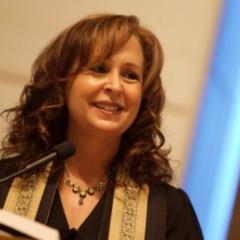
Volunteer of the Month: Cantor Lisa Segal
Lisa holds a BA in Sociology from the University of Florida. She completed certification through the ACC/HUCSSM in 2007. Lisa served Temple Beth Am in Pinecrest as a Cantorial Intern and Cantor alongside Cantor Rachelle Nelson for many years. She left her roots at Beth Am in 2011 to begin her tenure at Temple Beth Sholom, Miami Beach, Florida.
In what capacity have you volunteered for the ACC and were you asked, or did you put your name into the hat?
I served on the ACC board for three years as the Southeastern representative. During that period, I served on the fundraising committee and then on the youth committee. I am a co-chair of the 2015 convention in Fort Lauderdale together with Wendy AuntenriethAutenrieth. I put my name in the hat for the Board because I’d been recently certified and felt indebted to the ACC. It was a way of showing my gratitude by giving back to the Conference as a newly certified ACC Cantor.
What’s been the most rewarding for you regarding your volunteering?
I would say being privy to the many discussions regardingabout the trends and future offuture of the cantorate was been very intriguing and rewarding. Planning a convention in my area of town is exciting and rewarding.
In your experience, what’s the best part about being a Cantor?
I would say that the greatest reward for me is to lift up and empower my congregants to serve their community, whether chanting sacred text, singing, playing instruments, or leading minyanim as lay leaders. Raising up those you serve is the greatest gift a Cantor can offer.
What do you see as the biggest challenge facing the cantorate now and in the future?
Although we would like to utilize our time singing and learning repertoire, that is not our reality. We as Cantors, we need to remain relevant not only musically, but also relationally. We have to be willing and able to do it all: We must teach all ages from preschool to the elderly and keep the meaning and message of B’naei Mitzvah relevant and accessible for our busy families. We must visit the sick, fundraise, program, and console. Our diversity and willingness to roll up our sleeves is the key to our survival. We must be open to serve our communities well beyond our four walls, whether it is at our URJ camps or on college campuses. One of the ways I connect with my synagogue youth (besides being involved at Coleman on the clergy advisory committee and summer visits) is to that I fundraise to pay for a reform presence on the High Holy Days at Hillel at the University of Florida. I connect my students and parents with Hillel, provide personnel, Torah recordings, musicians and whatever else they need. It is crucial that the High Holy Day experience our Reform students have at that first introductory critical juncture is a positive, familiar and friendly one. This is an area I would like to see our Cantors be more involved in. Our college youth are our future synagogue leaders so it’s a rather worthy investment.
Why did you become a Cantor?
My passion for our musical tradition began in the foothills of northern Georgia where I spent my summers at URJ Camp Coleman on staff as a song leader. I was also a NFTY-SE regional song leader. In college, I led services for Hillel. After college, I spent six years working in corporate retail as a trainer and systems analyst. I left the retail professional world to teach music full time, at Beth Am Day school for 18 years. When our new senior Rabbi, Terry Bookman, began his tenure, he recognized my potential and encouraged me to become a certified cantor and be a part of his clergy team. The rest is history.
What do you want to share with us about yourself, thatyourself that we probably don’t know about you?
One of the reasons I felt a the calling to serve my Jewish community was that I had a rather tragic childhood upbringing. I lost both my parents at an early age. In fact, my Cantor growing up was Harold Orbach z”l. Whenever I would see him at conventions, it brought back a vivid memory of him singing at my mother’s funeral back in 1967 when she died at the age of 30, leaving four very young children behind. Growing up this way gave me a fierce drive for independence, survival and success. Thankfully, I was able to provide my own children with a more stable upbringing. My husband, Jimmy Segal, is a native of Miami. He grew up at my former temple, Beth Am. Both he and I, along with our children, Danny and Andrea, are all graduates of the University of Florida and we are very proud members of the Gator Nation. We love to return with our friends for football and tailgating. Another source of pride and passion is my love for rock music. I taught myself how to play guitar at age ten. My “Rock On Shabbat” Band plays at synagogues all over Miami during the year. My other band, “The Garage Band”, is a cover classic rock band that plays for local benefits and charities such as the Children’s Bereavement Center in Miami.

